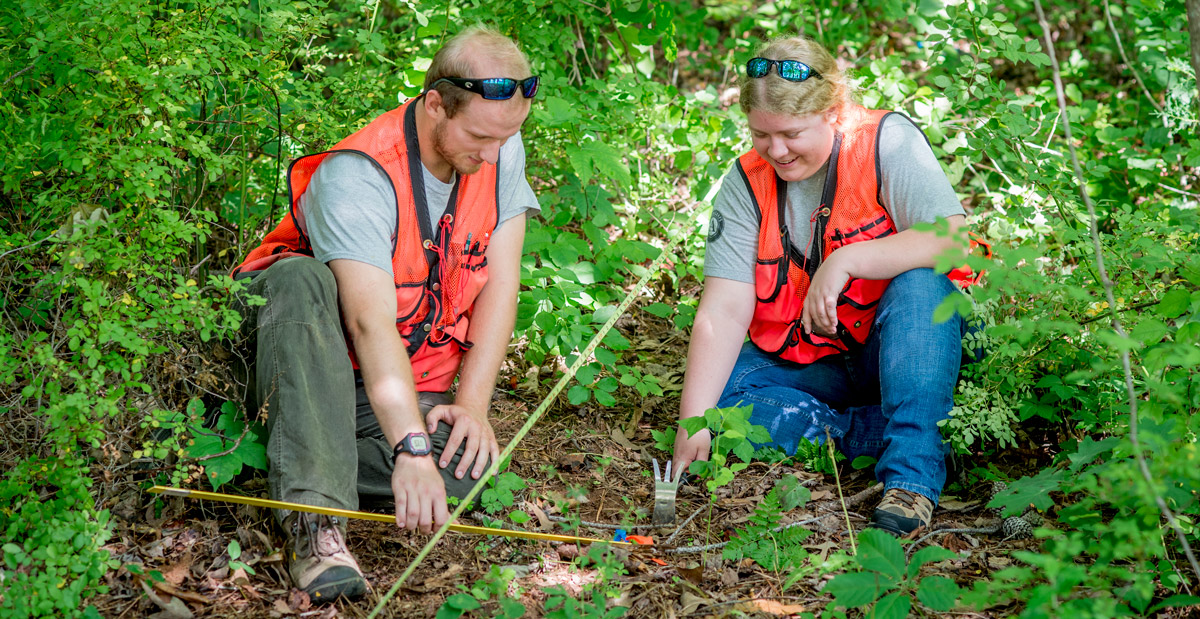Research and Facilities

The students, faculty, and staff of the Department of Geosciences and Natural Resources (GNR) benefit from a wealth of resources to support and enhance hands-on learning experiences in the classroom and out in the field. Students in the department benefit from the many partnerships and collaborations the faculty have developed with a wide variety of government, private, and non-profit agencies. These provide a wealth of practical internship and research experiences working on real-life problems.
Our students learn by going outside and doing—hands-on learning in the field. Our physical location is advantageous in that it gives faculty and students access to an abundance of on- and off-campus fieldwork opportunities.
On-Campus
Few campuses in the country have the on-campus field resources that we have at Western where you can study streams, soils, forests, wetlands, earth history, tectonics, water quality, as well as the affects of land development on environmental change.
Cullowhee Creek Field Station (CCEFS)
The CCEFS is an on-campus site developed to facilitate an investigative and interdisciplinary
approach to learning in introductory through advanced level classes in the geology
and physics programs.
Visit the website
Western Carolina Hydrological Research Station (WCHRS)
As part of Western Carolina Hydrological Research Station (WCHRS), North Carolina
Department of the Environment and Natural Resources (NCDENR) scientists and students
and faculty in the Department of Geosciences and Natural Resources are examining water movement through
the Southern Appalachian mountain environment.
Visit the website
Off-Campus
The department has access to a number of off-campus sites through partnerships with the following entities: National Park Service (NPS), United States Forest Service (USFS), and Balsam Mountain Preserve.
The Department of Geosciences and Natural Resources has a wide variety of educational and research resources. These include laboratory and field equipment, high-tech analytical equipment, and unique scientific collections.Our spaces include general teaching labs as well as facilities for GIS, microscopy, hydrology, and environmental geochemistry. Students are likely to encounter and utilize these resources throughout their studies in GNR.
- Environmental Geochemistry Lab and Prep Room
- Microscopy Lab
- GIS Lab
- Landscape Analysis Lab
- Geoscience Analytical Equipment Lab
- Core and Sediment Analysis Lab
- Hydrology Lab
- Rock Cutting & Crushing Lab
- Rock and Mineral Collections
The Department of Geosciences and Natural Resources enjoys a close relationship with the following affiliates that support educational, research, or internship experiences for our students. Each of these programs includes faculty from the GNR department.
Institute of Watershed Research and Management (IWRM)
WCU’s Institute of Watershed Research and Management (IWRM) brings together scientists,
policymakers, economic development experts, natural resource managers, and other interested
parties in an effort to preserve regional water resources while trying to ensure economic
prosperity.
Read more about the Institute
Program for the Study of Developed Shorelines (PSDS)
The Program for the Study of Developed Shorelines (PSDS) at Western Carolina University
takes a worldwide view of modern coastal processes and geologic hazards, examines
the scientific basis for managing developed shorelines in a time of rising sea level,
and advocates for the development and implementation of responsible strategies, plans,
policies, and actions that promote the long-term sustainability of our nation’s coastal
ecosystems.
Visit the website
Forest Stewards
Forest Stewards is a non-profit corporation created to promote and implement sustainable
forest management in the southern Appalachians. The goal of Forest Stewards is to
serve landowners of the Appalachians who desire to be good stewards of their forests.
We achieve these goals through a proactive program of education, demonstration, and
research in sustainable forest management. As an associated entity of Western Carolina
University, our goal is to make students, forest practitioners, landowners, policy
makers, and the general public aware of the importance of forest stewardship in protecting
the economic, social, and ecological sustainability of our southern highlands.
Visit the website